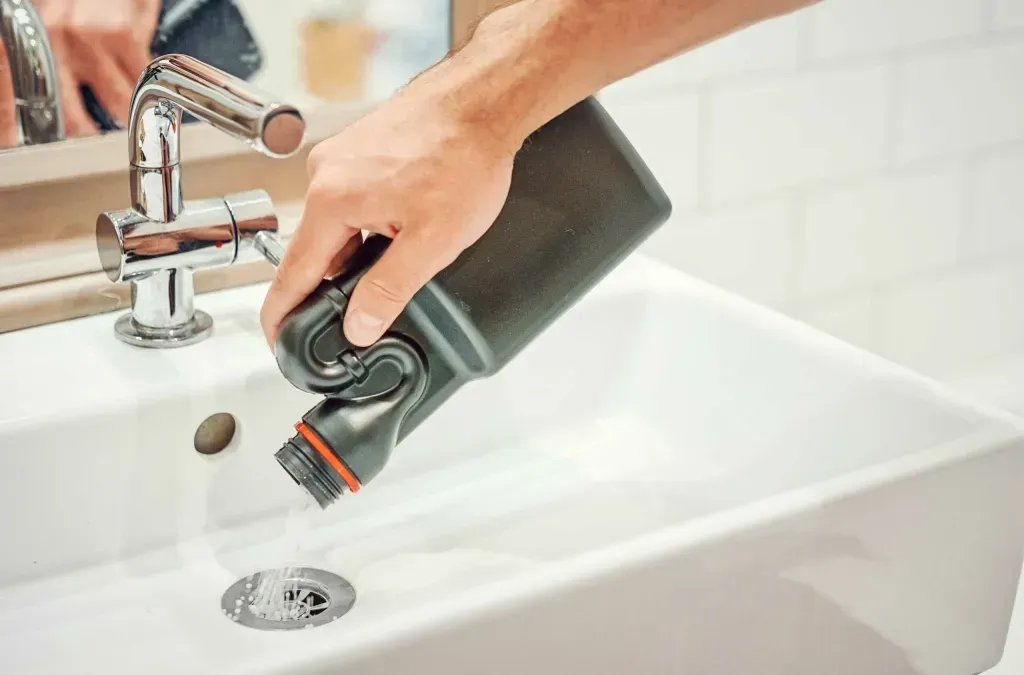Why You Shouldn’t Use Liquid Drain Cleaners
I've got some bad news for you: that bottle of liquid drain cleaner you’re about to pour down the sink might do more harm than good. Before you make a potentially costly mistake, let’s talk about why liquid drain cleaners aren’t the best solution for your clog problems. By the end of this guide, you’ll understand the hidden dangers of these products and discover safer, more effective alternatives to keep your drains clear and your home safe.
The Dangers of Liquid Drain Cleaners
Chemical Composition
- Liquid drain cleaners contain harsh chemicals like sodium hydroxide and sulfuric acid, which can be incredibly harmful.
- These chemicals generate heat and can cause reactions that might damage your pipes.
Health Hazards
- The fumes from these chemicals can irritate your eyes, skin, and respiratory system.
- Accidental contact can result in serious burns or other injuries.
- Long-term exposure to these chemicals can lead to more severe health issues.
Environmental Impact
- When these chemicals go down the drain, they eventually make their way to water treatment facilities or seep into the environment.
- They can contaminate water supplies and harm aquatic life, disrupting ecosystems.
- Proper disposal of these chemicals is challenging and often neglected, leading to widespread environmental damage.

Damage to Pipes
The corrosive nature of liquid drain cleaners can wreak havoc on your plumbing. These harsh chemicals eat away at both metal and plastic pipes, leading to corrosion and potential leaks. Over time, the damage can escalate, resulting in costly repairs or even the need for a full pipe replacement. If you have a septic system, using liquid drain cleaners can disrupt the natural bacterial balance, causing system malfunctions and expensive fixes.
Ineffectiveness on Tough Clogs
Liquid drain cleaners might seem like a quick fix, but they often fail to tackle tough clogs effectively. Hair, grease, and other stubborn blockages can resist the chemical onslaught, leaving you with a partially cleared drain that clogs up again in no time. These cleaners provide only a temporary solution, addressing the symptom rather than the root cause of the problem, which means you'll likely face recurring drainage issues.
Safer Alternatives
Natural Solutions
- Baking Soda and Vinegar: Pour baking soda down the drain, followed by vinegar. Let it fizz and sit, then flush with hot water.
- Salt and Hot Water: Dump a mix of salt and hot water down the drain to break down grease buildup.
- Lemon Juice and Baking Soda: Combine lemon juice and baking soda to create a natural, fragrant cleaner.
Mechanical Methods
- Plunger: A plunger can create the pressure needed to dislodge minor clogs. Make sure to use a plunger designed for sinks.
- Drain Snake: This tool can reach deep into your pipes to physically remove blockages, providing a thorough and effective solution.
- Plumbing Auger: For more stubborn clogs, a plumbing auger can navigate bends in the pipes and break apart the obstruction.
Preventative Measures
- Regular Cleaning: Clean your drains with natural solutions like baking soda and vinegar to prevent buildup.
- Use Drain Screens: Install screens over drains to catch debris and prevent clogs.
- Avoid Grease: Never pour grease or oil down the sink; dispose of them properly.
- Flush with Hot Water: Periodically flush your drains with hot water to keep them clear.
- Be Mindful of What Goes Down: Avoid putting non-dissolvable items like coffee grounds or hair down the drain.
Conclusion
So, there you have it—liquid drain cleaners might seem like an easy fix, but they come with hidden risks and limitations. From damaging your pipes to posing health and environmental hazards, they often do more harm than good. Instead, try natural and mechanical methods for maintaining clear drains and prevent future clogs with simple preventative measures. And if you’re dealing with persistent issues or need professional help, don’t hesitate to reach out to experts like All City Plumbers. They can provide safe, effective solutions and ensure your plumbing stays in top shape
What You Can Do About A Gurgling Noise In Your Sink











